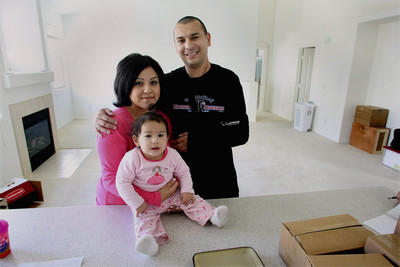Group invests in hurt soldier

For every soldier who dies in battle, many more are injured.
Those who make it home from war sometimes bring back more than just a Purple Heart. They bring injuries so severe that the rest of their life is changed dramatically.
But thanks to the Sentinels of Freedom Foundation, Enrique Pineda, 27, can be added to the long list of wounded soldiers who have had a little help as they start anew.
The Army specialist was wounded Jan. 25, 2007, when he was on patrol in Yousifiah, Iraq, with the 10th Mountain Division out of Fort Drum, N.Y. He and the other soldiers were looking for a sniper who had already hit two other men from the division.
“In the morning we were doing dismounted patrol, checking out the locals,” Pineda said. “We were out in the open, and then I heard the pop.”
Sgt. Shaun Dunn of Lake City, Fla., was near Pineda and pulled him to safety, but damage had already been done.
The sniper’s bullet damaged the brachial plexus — a bundle of nerves responsible for controlling the arm — on Pineda’s left side, causing him to lose all use of his left arm. Two surgeries and a year of physical therapy later, he has minimal movement and feeling in his arm and still carries it in a sling.
At home with his family, Pineda laughs and smiles, even though the adjustment has not been easy. His wife of 21/2 years, Jessica, 26, helps with tying his shoes, opening jars and other tasks too difficult to do with only one hand.
“My wife is my other arm to me,” Pineda said.
And with 16-month-old daughter Avianna running around, making sure everything is taken care of is sometimes difficult.
“It’s kind of like having two kids,” Jessica Pineda said, she and her husband both laughing. “I have to be strong for the whole family, but being an Army wife kind of toughened me up.”
The Pinedas know how frustrating it can be for soldiers to get back on their feet after an injury or accident. In addition to the lifestyle changes, it was difficult to cope financially.
Eventually, they were introduced to the Sentinels of Freedom Foundation by Mary Ellen Sauer, a civilian employee at Fort Drum who helped them get the benefits and compensation they were due.
“There’s help out there and people who do care, so you can’t give up,” Jessica Pineda said.
After an interview with Mike Conklin, the founder of the Sentinels of Freedom Foundation, they sent in an application and were accepted for the four-year “life scholarship.”
As part of the scholarship, the Pinedas have been provided a house in northwest Las Vegas, rent-free for four years. They also received new furniture and household supplies, career-placement assistance and training, educational opportunities, and financial and personal mentoring. A new car, adapted to allow Enrique Pineda to drive with one hand, was delivered to their home, as well as a new computer with a one-handed keyboard and voice-recognition software.
“It’s overwhelming and a dream come true,” he said.
This is the first time the foundation has placed a soldier in Nevada.
The Sentinels of Freedom Foundation has lodging and jobs already available in several cities across the country, but Pineda, who is originally from Fresno, Calif., requested to be close to his brother, sister and mother, who had recently moved to Las Vegas.
“He’s doing better than we had thought he would,” said Alex Lira, Pineda’s brother. “He gets a little frustrated here and there, but for the most part, he’s adjusting.”
The family comes from a military background, and they all supported Pineda’s decision to join the Army.
“He’s changed a little bit since he’s been back,” Lira said. “But for the most part, he tends to be the same Enrique. We’ve always been real close. I’m just happy that he’s home and that he’s safe.”
The Sentinels of Freedom Foundation began after founder Conklin’s son was wounded in Iraq in 2003. Since then, the foundation has placed 24 veterans in six states.
“I think this is an unbelievably wonderful cause,” said Joan Kuptz, a local broker/owner for RE/MAX Advantage who worked with the Pineda family to find housing. “We have a chance to help this young man assimilate back into the community.”
The foundation is directed toward those members of the military who suffered severe injuries in the line of duty on or after the terrorist attacks of Sept. 11, 2001, resulting in amputation, blindness, deafness, paraplegia or severe burns.
Soldiers who are chosen for the life scholarship must be committed to becoming independent and successful members of society.
“They have to have the right attitude,” said Gale Ingram, national administrator for the foundation. “We give them a lot, and we expect them to want to get a job and go to work every day and possibly get enrolled in school.”
Those soldiers who may be suffering from depression or other mental issues in such a way that would keep them from fulfilling work responsibilities would not be considered as candidates for the program.
“We’re trying to get them back on their feet,” Ingram said. “So in four years, when the scholarship is over, they can get on with their lives, on their own and with their family.”
Funding for the foundation comes strictly from donations, either from individuals or corporations. The program started working on the national level in January 2007.
“It just takes a little while to get some momentum,” Ingram said. “But I’m looking forward to every month more and more soldiers taking advantage of what we have to offer.”
Contact reporter Scott Spjut at sspjut@reviewjournal.com or (702) 383-0279.